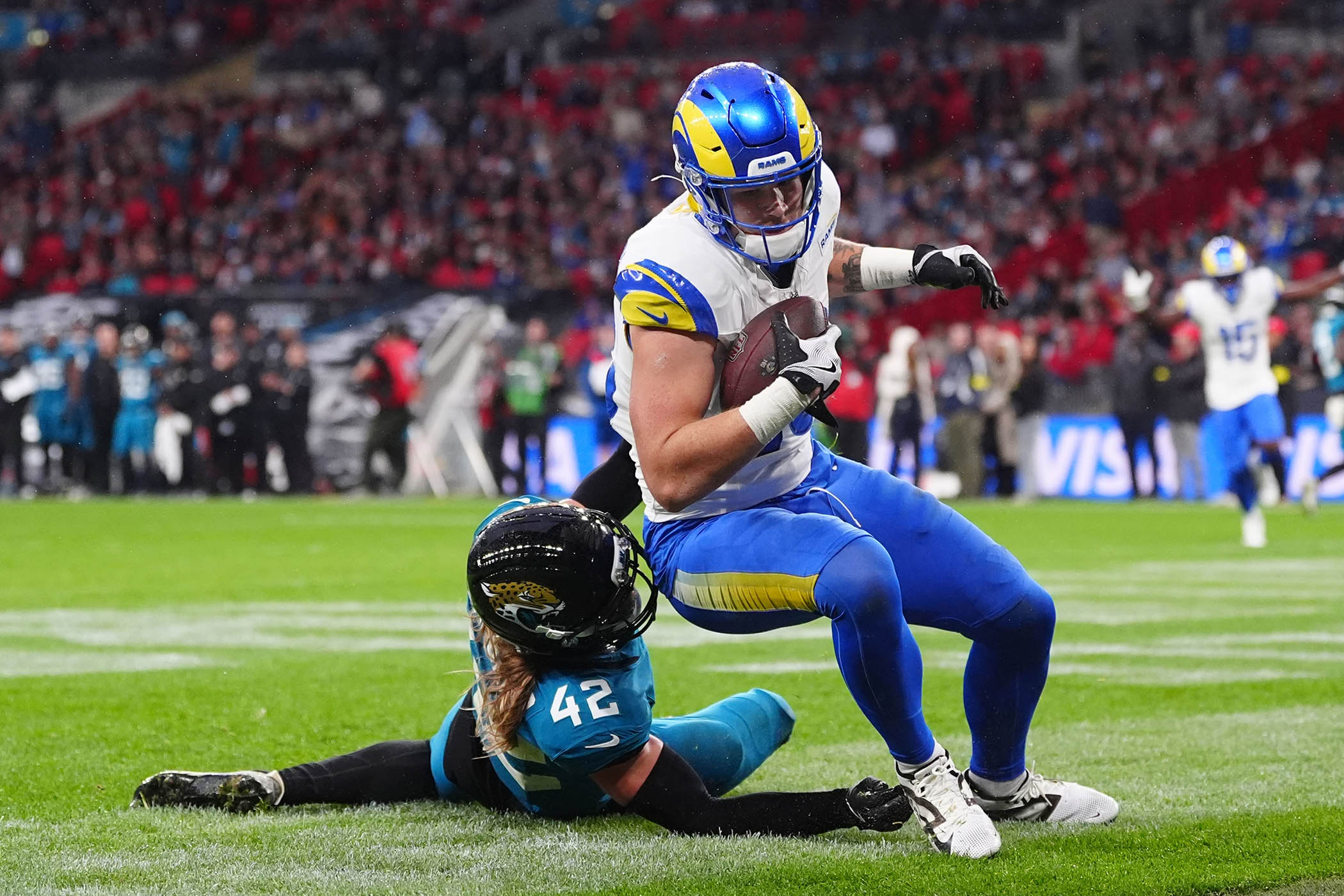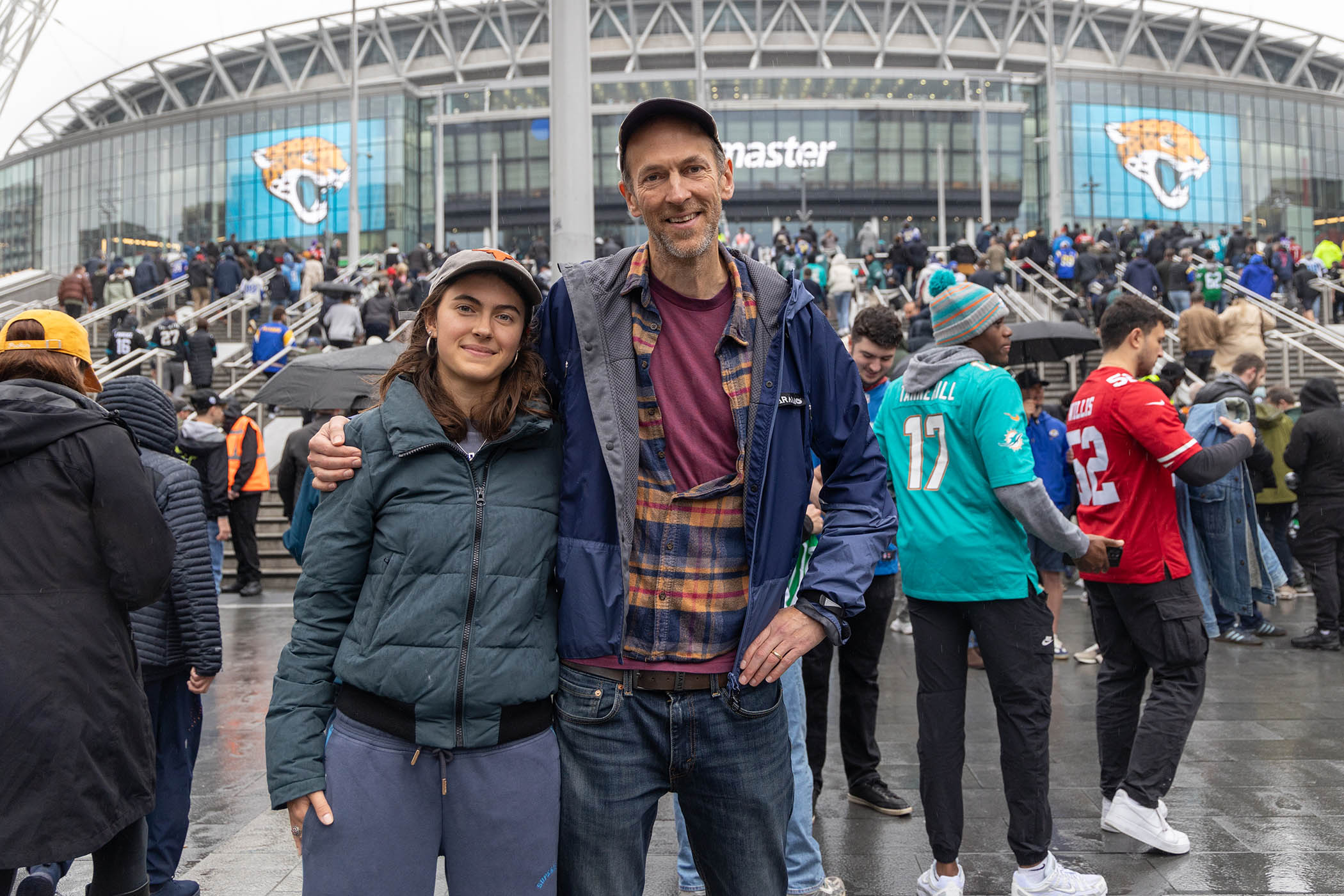It probably started with the pandemic. I always hoped that my kids would spend at least a year of their childhoods in Austin, my hometown, but instead we holed up every evening watching Friday Night Lights. That was the closest we came. It’s about a small-town Texas high school football coach and the players on his team, the cheerleaders they go out with, and his wife and daughter. Much of it was shot in Austin. The games were filmed at House Park, the small stadium north of the river where my own high school used to play. Watching it kept me in contact with America at a time when I couldn’t visit or see my family. For my kids, the show came to stand for my youth, even though it was full of people having the kind of childhood I never actually had.
Somehow, five years later, that moment led us here: on a Sunday afternoon in October, my daughter and I were going to Wembley. It was as though a giant stick had stirred up north-west London and all the people in it had begun to resettle on the stadium.
Getting out of the tube, we joined the flow of traffic along Olympic Way, past the burger and merch stalls, the newly built blocks of flats, the banners lining the road with images of American football players. A lot of people were taking pictures of themselves under the stadium’s arch. It’s one of those things you save up for, to be part of that crowd. Even in real time it has the flavour of a memory.
As a kid, I spent every Sunday watching the NFL, playing catch in the back yard between games. But after 30 years in England I’d given up on it – just one of those things you let slide in adulthood. Until Gwen became a fan, and her enthusiasm rekindled mine. Maybe to relieve the stress of her A-levels, to remind herself that she had roots elsewhere, we started heading to the local park while she took a break from revision and tossing a football back and forth. (It annoyed me that she throws a tighter spiral than I do.) Then a few weeks ago she left for university. Our household of four became a household of three. You have plenty of warning but it still hits you. And part of what hit me was that her childhood was finished now, it had come out of the kiln. All those things we wanted to do in it, like live in America, wouldn’t happen now.

Terrance Ferguson of the Los Angeles Rams scores a touchdown at Wembley
For months she’d been asking me about getting these tickets, when she heard the NFL was coming to London. And for us it was a chance to have her home again, at least for the weekend.
She wore her brother’s Texas Longhorns cap; I had on my Ostsee hat, from the town in northern Germany where my mother grew up. Before kick-off, event staff filled the field with two large flags, held up and rippled in rhythm – the union flag and the stars and stripes – while singers sang each national anthem in turn. It seemed fitting.
Gwen and I are both Dallas Cowboys fans, but the specifics of the game weren’t important. The Jacksonville Jaguars were playing the Los Angeles Rams, but we also saw a lot of Cowboys caps in the crowd, Green Bay Packers gear, Patrick Mahomes jerseys. Whatever allegiance or merchandise people had in the closet was on display. All of which contributed to the feelgood vibe.
Football is the American sport most closely linked to the school year. The beginning of the season is a consolation prize for the end of the summer holiday, while the build-up to the Super Bowl takes the edge off back-to-school blues after Christmas.
But I was also thinking about my own first term at university. The truth is, I didn’t want to be there. On Sundays I used to buy a dozen Dunkin’ doughnuts in the morning, and then sit around my dorm room after lunch, watching football on my roommate’s TV, and working my way through the doughnuts. From this distance, it obviously looks like what it was: unhappy behaviour. But it was also a statement of intent: the things I liked before, that I still like ... just because I’m here, doesn’t mean I’ve changed. But you change anyway.
We bought hot dogs and popcorn, and waited for the game to start. Our seats were close enough that someone could have thrown us a ball from the field of play. I don’t go to a lot of live sports but whenever I do I feel a little jealous ache, at the gap between spectator and participant. My first job coming out of university was playing minor-league professional basketball in Germany. On Saturday nights we used to run onto the court in front of two or three hundred people. (After that I spent most of the game on the bench.) But the closest I came to playing in front of this kind of crowd was in high school, when our basketball team made it to the state championships. The semi-finals were held at the old Frank Erwin Center, where the Texas Longhorns used to play, though by that point I was sitting in the audience with everyone else, watching, because I’d quit the team a few months earlier.
The Jaguars emerged from the tunnel in front of 86,651 people, and a groundswell of feeling passed through the crowd. This is the kind of thing Gwen loves, to be in the middle of all this spectacle; and because of her, I was very happy to be there, too.
Newsletters
Choose the newsletters you want to receive
View more
For information about how The Observer protects your data, read our Privacy Policy
Parenthood reminds me of the old Pulp Fiction line about Europe: the thing about your kids is … the little differences. Gwen and I take the same pleasure in arguing, where you pick on any statement, no matter how trivial, to see if you can turn it into an interesting disagreement. For the fun of it, not the fight, though it sometimes sounds like fighting. These are the conversations I grew up with, at the family dinner table – one of those comforting continuities. We move alike, too, and stand with the same kind of balance on our feet. But she also has her mother’s social energy, her gift for joy and appetite for experience, which is why we we’re here.
I was excited to see Matthew Stafford, the Rams’ quarterback, and a potential hall of famer. He’s 37 now and offers a heartwarming picture of middle-aged self-assurance in the face of the younger and more athletic players scrambling around him. He never seemed to hurry and led the Rams to touchdowns on their first two drives. The game was more or less decided by half-time, but that didn’t matter; we didn’t care who won.
In the second half, we got to see the Jaguars’ only score, on a 34-yard pass to rookie Travis Hunter, a future star – one of those athletes who, in a world of the super-fast, still looks faster. It was his first professional touchdown. Stafford, as the clock wound down, stood on the sidelines and waved and blew kisses ... towards someone in the crowd? It felt almost like a private moment; he’d had a good day.
So had we. We stayed until the mild, damp end, and then drifted away again, with the other 86,000, back to the station and another Sunday night.
In his preface to The Scarlet Letter, Nathaniel Hawthorne wrote: “My children have had other birthplaces, and, so far as their fortunes may be within my control, shall strike their roots into unaccustomed earth.” I feel like there are two kinds of parents: the ones who want to reproduce their own childhoods, and the ones who want to give their kids a different life. But in the end you do a bit of both.
I was the child of professors; I went to 11 different schools in three different countries. One of the consequences of that was an odd kind of self-containment, a reluctance to join in, which my kids have done their best to cure me of. In any case, that’s not the childhood they’ve had; maybe that’s why Gwen has made a much happier start to adult life than I did. Even if, after giving her dinner that night, we – a little heartbroken – sent her off again to the train station, and a late-night journey towards her new home.
Ben Markovits’s novel The Rest of Our Lives (Faber & Faber) is shortlisted for the 2025 Booker prize. Order a copy at observershop.co.uk for £9.99. Delivery charges may apply
Photographs by Andy Hall for The Observer, Bradley Collyer/PA Wire


